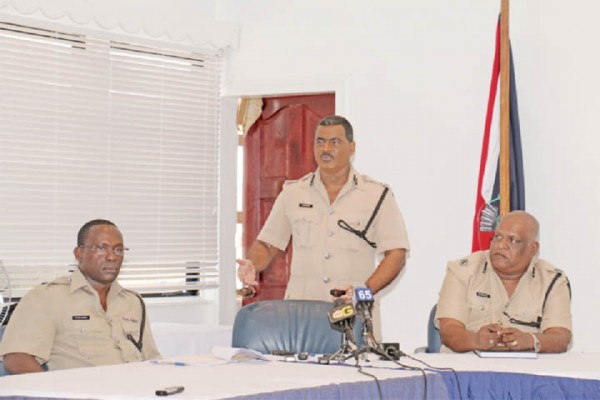The Guyana Police Force yesterday said that it is making progress in the implementation of recommendations for its improvement from the 2003-2004 Disciplined Forces Commission (DFC) Inquiry.
Yesterday several senior members of the force met with members of the media to share some of the progress made, including training in key areas, while admitting that in some areas work is ongoing. Over the years opposition leader David Granger, who served on the commission,

had raised concerns that the recommendations set out in the report had not been implemented.
Assistant Commissioner (Operations) David Ramnarine, in a PowerPoint presentation that lasted close to an hour, highlighted the work done so far in relation to each of the recommendations. In his opening remarks, he said that the force should be complimented by the media for being able to do the PowerPoint presentation. He said that the presentation was some time in the making and at the start of the year at a retreat an initial presentation was made. What was contained in that presentation, he explained, was generally accepted and a decision made to present it to the public through the media.
According to Ramnarine, the presentation sought to highlight what is the status of the recommendations. However, he cautioned that while the action on the recommendation may be interpreted as completed, one must understand that the action is “an ongoing action.” He said too that “there are some in working progress” while there are a few others that are not within the remit of the force.
The recommendations made sought to tackle some of the problems affecting the force with the hope of making it more modern and capable to carry out its functions. Some of these recommendations are related to the boosting of the force’s investigative capacity and training as well as addressing its ethnic make-up and recruitment.
With respect to the recommendation which called for more personnel to be trained in handwriting, fingerprinting, ballistics and related fields and for their deployment in the divisions so as to reduce the need for all such investigations to go to CID Headquarters, Ramnarine said that action had been taken although there is a difficulty locating training institutions. He said training in the areas of fingerprinting, photography and crime scene processing is ongoing. He said too that handwriting and ballistics training is currently inadequate and that a list of training needs have been submitted to the Ministry of Home Affairs
With regard to a recommendation that ranks should be trained to remain unmoved and dispassionate, especially in the face of provocation, he said that there has been training in the areas of anger management and conflict resolution. He noted too that in keeping with other aspects of the recommendations, police stations have been set up in housing schemes and the former E&F Division has been delinked.
He said too that there has been training, instructional classes, briefings and the publication of Standing Orders/Force Orders in relation to the need for the use of minimum force. Ranks, he said, have benefited and continue to benefit from courtesy and politeness training as well.
Ramnarine, in his presentation, said too that the force supports the recommendation reviewing salary structure and substantial increases in remuneration to enhance career attractiveness and urged that the government give the area priority.
The commission came into being during a time when Guyana was faced with a wave of serious crimes, particularly on the East Coast, and those sitting on the commission were tasked with making recommendations for improvement to respond to the public security crisis for not only the force but also the other disciplined forces – the Guyana Prison Service, the Guyana Fire Service and the Guyana Defence Force. A total of 164 recommendations were made for the four forces and that report was handed over to then Speaker of the National Assembly Ralph Ramkarran, in May 2004. The report was then laid before the National Assembly on May 17, 2004 and was accepted unanimously. A select committee was then established in November 4, 2004, with a mandate to report to the National Assembly in four months but this process dragged on for years.
After spending six years before a special parliamentary select committee, the review report of the recommendations made by the Disciplined Forces Commission, was on June 10, 2013 unanimously passed by the National Assembly, prompting Home Affairs Minister Clement Rohee to then predict the continued modernisation of the country’s disciplined services.
Also present at yesterday’s briefing were Crime Chief Seelall Persaud and Assistant Commissioner of Administra-tion Balram Persaud. Police Commis-sioner Leroy Brumell was unable to be present at yesterday’s presentation as he was at the opening ceremony of the National Road Safety Conference.




